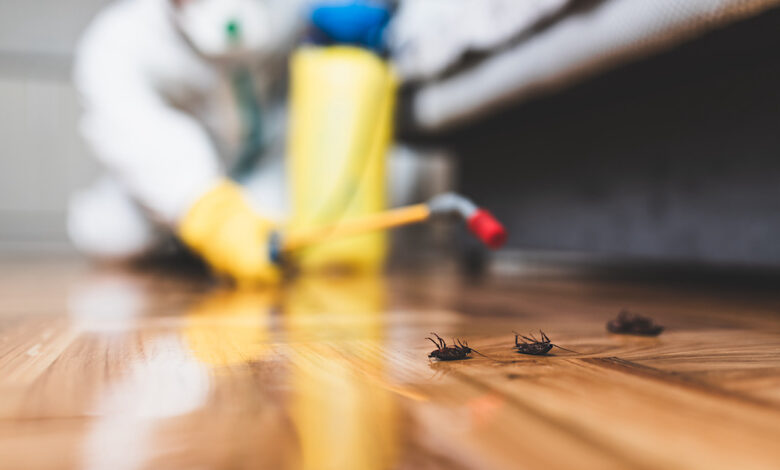DIY vs. Professional Pest Control: When to Call an Expert

Dealing with pests can be frustrating, especially when they keep coming back no matter how many sprays, traps, or repellents are used. Many homeowners try to handle infestations on their own, hoping that a few store-bought solutions will do the trick. While DIY pest control can work in some cases, it’s not always the most effective or long-lasting solution.
Some pests are easy to manage with basic home remedies, but others require professional intervention. Rodents, termites, and bed bugs, for example, are known for being stubborn and difficult to eliminate without expert techniques. Knowing when to handle a pest problem yourself and when to call a professional can save time, money, and frustration.
Understanding the differences between DIY and professional pest control helps homeowners make informed decisions. While some minor pest issues can be tackled with home treatments, serious infestations demand the expertise of trained professionals.
When DIY Pest Control Might Work
For small, isolated pest problems, do-it-yourself methods can sometimes be enough. Home remedies and store-bought solutions can help manage minor infestations if they are caught early.
1. Preventing Minor Infestations
Prevention is always the best approach to pest control. Simple maintenance habits can keep pests from becoming a problem in the first place.
✔ Sealing cracks and gaps around doors, windows, and walls to block entry points.
✔ Keeping food stored in airtight containers to prevent ants, rodents, and cockroaches.
✔ Eliminating standing water to stop mosquito breeding.
✔ Regularly cleaning and decluttering to remove hiding spots for pests.
2. Treating Occasional Insects
Some insects, like fruit flies or house spiders, don’t require professional treatment. They can often be managed with simple solutions.
✔ Using vinegar traps for fruit flies.
✔ Placing sticky traps for occasional spiders.
✔ Spraying essential oils or insect repellents to deter common household bugs.
3. Using Traps for Small Rodent Issues
If a single mouse or rat is spotted, DIY traps can sometimes take care of the problem before it worsens.
✔ Snap traps, baited with peanut butter, can catch a lone mouse.
✔ Sealing entry points prevents more rodents from entering.
✔ Keeping garbage bins tightly closed reduces rodent attraction.
While these DIY methods may work for minor pest issues, they are not always reliable for larger infestations. Some pests require specialized treatments that are beyond what store-bought products can handle.
When Professional Pest Control Is Necessary
Not all pest problems can be solved with DIY solutions. Some infestations are too severe, too widespread, or too dangerous to handle without expert help.
1. Recurring Pest Problems
If pests keep coming back despite repeated DIY efforts, it’s a sign that the infestation is bigger than it appears.
- Cockroaches may survive store-bought sprays and continue multiplying in hidden spaces.
- Ants return in full force if the queen is not eliminated.
- Rodents reproduce quickly, making traps ineffective for large infestations.
Professional exterminators use advanced techniques to identify and target the source of the problem, ensuring long-term pest control.
2. Termite Infestations
Termites are one of the most destructive household pests, causing structural damage that can cost thousands of dollars in repairs.
- DIY termite treatments are rarely effective because termites hide deep within wood.
- Professional exterminators use specialized treatments like baiting systems and liquid barriers to eliminate colonies.
- Early detection through professional inspections can prevent major damage.
Ignoring termite infestations can lead to severe structural issues, making expert intervention critical.
3. Bed Bugs That Won’t Go Away
Bed bugs are one of the hardest pests to eliminate with DIY treatments. They hide in tiny crevices and can survive for months without feeding.
- Store-bought sprays often fail to reach all bed bug hiding spots.
- Washing bedding and vacuuming may help but won’t fully eliminate the infestation.
- Professional heat treatments and targeted insecticides are needed for complete removal.
Bed bug infestations can spread quickly, so calling an expert as soon as they are detected is the best way to prevent them from taking over a home.
4. Large Rodent Infestations
A single mouse might be manageable, but multiple rodents require professional extermination.
- Rats and mice reproduce rapidly, making DIY trapping ineffective.
- They can cause electrical fires by chewing on wires and contaminate food with diseases.
- Professionals use advanced baiting and exclusion methods to ensure complete rodent removal.
Ignoring a rodent problem can lead to health hazards, structural damage, and ongoing infestations.
5. Dangerous Pests Like Wasps or Scorpions
Some pests pose immediate risks and should only be handled by professionals.
- Wasp nests near homes can become aggressive and sting when disturbed.
- Scorpions and venomous spiders require expert removal to prevent injury.
- Professional pest control ensures safe extermination and long-term prevention.
Attempting to remove dangerous pests without proper training can lead to serious health risks.
Why Professional Pest Control Is More Effective
While DIY pest control methods can provide short-term relief, professional extermination offers long-term solutions that prevent future infestations.
1. Advanced Treatments and Equipment
Professional pest control companies use powerful, targeted treatments that are not available to consumers.
- Heat treatments for bed bugs that kill all life stages.
- Baiting systems that eliminate entire termite colonies.
- Eco-friendly solutions that minimize chemical exposure.
2. Expert Knowledge and Experience
Trained exterminators understand pest behavior, making them more effective at identifying infestations and applying the right treatments.
- They know where pests hide and how to target them.
- They can recognize signs of infestations before they become severe.
- They use integrated pest management strategies for long-term prevention.
3. Long-Term Prevention Plans
Professional pest control services don’t just eliminate pests—they help prevent them from returning.
- Routine inspections catch infestations early.
- Barrier treatments keep pests from re-entering homes.
- Expert advice helps homeowners maintain a pest-free environment.
4. Cost Savings in the Long Run
Although professional extermination may seem expensive upfront, it can save money in the long term.
- Preventing termite damage avoids costly home repairs.
- Eliminating rodents reduces the risk of electrical and structural damage.
- Stopping recurring infestations prevents repeated expenses on ineffective DIY products.
Making the Right Choice for Pest Control
Every homeowner wants a pest-free home, but choosing between DIY and professional pest control depends on the severity of the infestation.
✔ DIY pest control is best for minor issues, like occasional insects or a single mouse.
✔ Professional extermination is necessary for severe infestations, recurring problems, or pests that pose health risks.
When pests become too difficult to handle alone, calling an expert is the best decision. Agile Pest Control offers reliable pest management solutions to eliminate infestations and prevent future problems.
Keeping a home pest-free requires more than just quick fixes—it requires long-term strategies that ensure lasting results. Knowing when to use DIY methods and when to call a professional can make all the difference in maintaining a safe, healthy, and pest-free living space.




